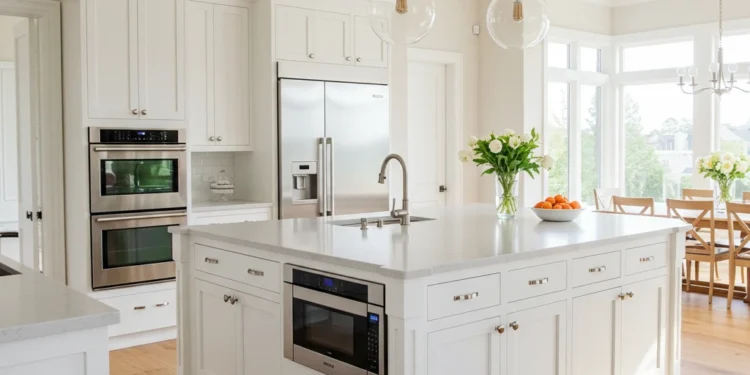Home renovations are equal parts fun and stressful. If you’re new to renovating, you may be caught up in your vision for the results and choosing your finishes and color palettes to create the home of your dreams—or a home that’s likely to appeal to buyers.
But renovations aren’t always smooth sailing. It’s easy to make mistakes in the process that end up with project delays, high costs to fix problems, and a lot more frustration than necessary. Fortunately, planning ahead and avoiding the common pitfalls with home renovation projects can make your experience as smooth as possible.
Budget Miscalculations
Everyone knows you need a budget to plan a renovation, but that’s still one of the most common mistakes that occur with a home renovation. Even if your project goes exactly as you expect, it’s not uncommon to have final numbers that exceed the budget by a small amount. And if you run into issues, that can quickly eat away at your money.
It’s always best to prepare for a higher amount than you expect. Set contingency funds aside that account for about 10-20% of the total estimated costs for your projects. This gives you some cushion for surprises or delays that may happen, especially with larger renovations.
Poor Planning
Home renovations are exciting. It’s natural to want to get started as soon as possible, but neglecting the planning phase can lead to headaches in the future. Whether it’s a small bathroom refresh or a whole-home remodel, you need to consider the requirements of each part of the project and how it all flows together.
Take time upfront to do your research and approach your renovation strategically. An experienced contractor can help you decide the best approach to streamline your plans and maximize your budget.
DIY Mistakes
It’s tempting to try to save money with tool rentals and a YouTube video. However, if you don’t have home renovation skills, you have to be careful what projects you try to tackle on your own. Simple tasks like updating light fixtures or installing a kitchen backsplash are in the realm of many homeowners, but installing flooring, rewiring electrical, or replacing a roof are not.
If you try to take on a project that’s out of your depth, you could end up with problems that are more expensive to fix, significant delays in your timeline, or dangerous situations. Always hire a professional contractor for critical tasks like structural repairs, electrical, and plumbing work.
Cheap Materials
Your renovation doesn’t need to be all expensive, high-end options, but cutting corners on certain materials and finishes isn’t necessarily the most cost-effective option. You need to find the balance between affordable options and quality that will last.
For materials that will take a lot of abuse and require maintenance, it’s best to choose the highest quality you can fit into your budget.
For example, flooring and kitchen countertops are subjected to a lot of wear and use, so you want high-quality options. Alternatively, you can save money on elements like backsplash tile that endures less wear. Generally, choose quality for structural or high-traffic elements and reserve your cost-cutting for more aesthetic choices.
Cheapest Contractor
Saving time and money matters, but you shouldn’t rush the process of choosing a contractor or go with the lowest bid. Your contractor is the most important aspect of keeping your project running smoothly and ensuring a quality result. They also help you get competitive pricing on subcontractors.
Remember, you get what you pay for. Take the time to check references, look at client testimonials, and validate licensing and insurance. Once you have a short list of quality contractors, you can start comparing quotes.
Poor Ventilation
Most homeowners focus renovations on fixing any existing problems and creating the aesthetic they want. Your vision matters, but you can’t neglect the “invisible” aspects of your home that affect quality of life, like ventilation.
Upgrading your home’s ventilation is a big investment, but it’s worthwhile for your home comfort and future expenses. Proper ventilation reduces airborne allergens and keeps moisture at bay, preventing mold buildup in the future. This is especially important in kitchens and bathrooms that experience high moisture levels and possible water intrusion.
Code and Permit Compliance
Most renovation projects require permits and have to adhere to local building codes. Before you can plan, you need to know about any specific building codes that apply and obtain the proper permits to make sure your project is legal. Otherwise, you could end up with hefty fines at best, or dangerous living situations at worst.
Before you start your project, talk to your local city offices and find out what you need to do for your renovation. Always follow the codes and obtain your permits in advance to avoid any delays.
Planning for Now
Your home should be what you want it to be. However, if your life changes—you have a baby, you decide to move, or you need to accommodate an aging family member—the choices you make now can affect future renovations. For example, making large structural changes like turning your living spaces into open concept can make it more challenging to create an additional bedroom or home office and may affect how prospective buyers view your home.
Think about your needs now and in the future and plan accordingly. Knowledgeable contractors can help you design a space that fits your needs now and allows for easier renovations if things change, such as adding accessibility features or multipurpose spaces.
Energy-Efficiency
A home renovation is a great opportunity to improve your home’s energy efficiency, but it’s also a mistake many homeowners make. For example, they may skip insulation upgrades because it costs too much or choose low-quality windows or siding. While this can save money now, you could end up with higher energy bills and lower home comfort.
Incorporate energy-efficient options wherever you can, such as updating your HVAC system, fixing any old or worn insulation, installing new windows, and upgrading your lighting and appliances. The upfront costs may be worth the energy savings over the next decade.
Approach Home Renovation Strategically
Mistakes in home renovations can leave you with stress, a lot of wasted time and money, and a project that takes forever to complete. But if you approach your renovation strategically, you can avoid the common errors homeowners make while bringing your vision to life.
Author Information
Author Name: Michael Alladawi
Author Bio:
Michael Alladawi, CEO & Founder of Revive Real Estate, is a Southern California real estate veteran with a proven track record as a builder, investor, and respected home flipper. Michael created Revive Real Estate to share his industry knowledge and help homeowners maximize their profits when selling their homes. Michael’s passion for his work is as big as his desire to create lasting partnerships. For Michael, it all comes down to how much value one offers, both in business and life relationships.












